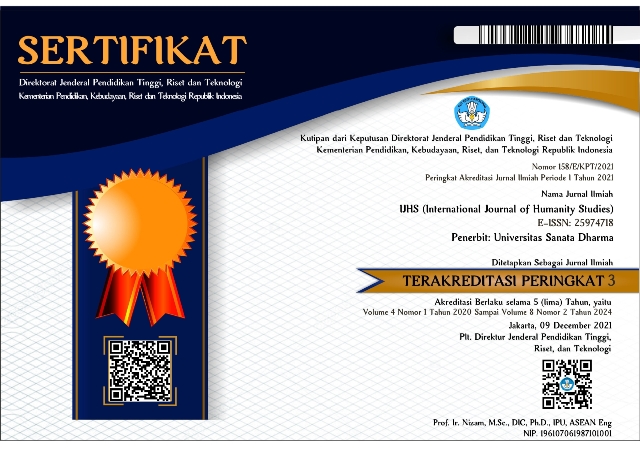COMMUNICATION FAILURES IN NETFLIX DRAMA SERIES 13 REASONS WHY: A PRAGMATIC ANALYSIS
(1) Sanata Dharma University, Yogyakarta
(2) Sanata Dharma University, Yogyakarta
(3) Sanata Dharma University, Yogyakarta
(*) Corresponding Author
Abstract
Keywords
Full Text:
PDFReferences
Ary, D., Jacobs, L. C. & Sorensen, C. (2010). Introduction to research in education (8th ed.). Belmont: Wadsworth Cengage Learning.
Crystal, D. (1992). Introducing linguistics. London: Penguin.
Economidou-Kogetsidis, M. (2011). Please answer me as soon as possible: Pragmatic failure in non-native speakers e-mail requests to faculty. Journal of Pragmatic, doi:10.1016/j.pragma.2011.06.006
Kathy, P. (2015). Psychoanalysis: The defenses, anxiety and core issues. Educational Website Content Management.
Leech, G. (1983). Principles of Pragmatics. New York: Longman.
Luo, R. (2016). Analysis of pragmatic failure and pragmatic ability formation in English teaching. 2nd International Conference on Humanities and Social Science Research.
Luo, X. & Goa, J. (2011). On pragmatic failures in second language learning. Theory and Practice in Language Studies, 1(3), 283-286.
Pangestu, N. A. & Sunardi, F.X. D. (2016). An incomplete psychological novel: A psychoanalytical analysis of hazel lancaster in John Greens The Fault in Our Stars. Journal of Language and Literature, 16(1), 20-28.
Semino, E. (2014). Pragmatic failure, mind style and characterisation in fiction about autism. Language and Literature, 23(2), 141158.
Shammas, N. A. (2005). Lingua-pragmatic politeness and translatability. Damascus University Journal, 21, 3+4, 23-56.
Tang, J. (2013). Analysis of pragmatic failure from the perspective of adaptation. Cross-Cultural Communication, 9(3), 75-79.
Thomas, J. (1983). Cross-cultural pragmatic failure. Applied Linguistics, 4(2), 91-112.
Thomas, J. (2013). An introduction to pragmatics. New York: Routledge.
Tyson, L. (2006). Critical theory today. New York: Routledge.
DOI: https://doi.org/10.24071/ijhs.v1i2.1074
Refbacks
- There are currently no refbacks.
Copyright (c) 2018 Astri Wulandari, Brigittai Shinta Hapsari, Barli Bram
Indexed and abstracted in:
IJHS Sinta 3 Certificate (S3 = Level 3)
International Journal of Humanity Studies (IJHS) has been nationally accredited Sinta 3 by the Ministry of Education, Culture, Research and Technology of the Republic of Indonesia based on the decree No. Surat Keputusan 158/E/KPT/2021. Validity for 5 years: Vol 4 No 1, 2020 till Vol 8 No 2, 2024

This work is licensed under CC BY-SA.
Creative Commons Attribution-ShareAlike 4.0 International License.
p-ISSN: 2597-470X (since 31 August 2017); e-ISSN: 2597-4718 (since 31 August 2017)
Notice: The opinions expressed in this publication are those of the authors. They do not purport to reflect the opinions or views of the editorial team or publishers.
International Journal of Humanity Studies (IJHS) is a scientific journal in English published twice a year, namely in September and March, by Sanata Dharma University, Yogyakarta, Indonesia.

















